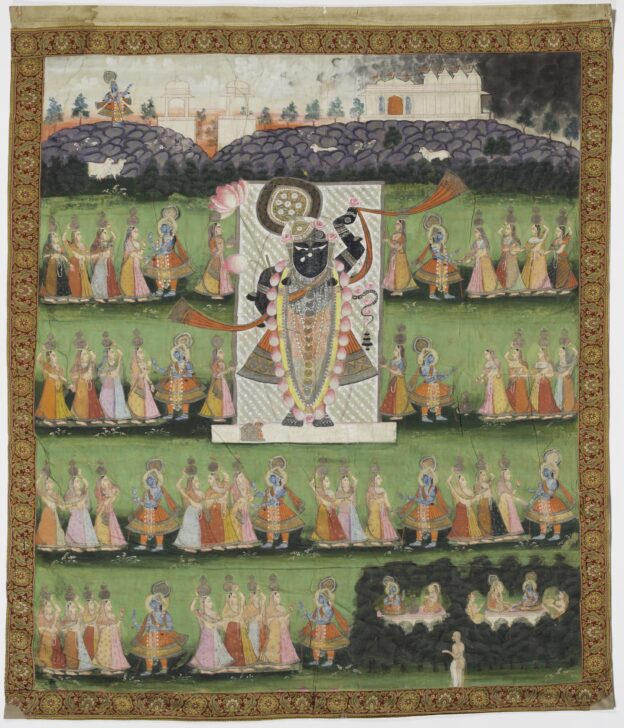Picchvai
Indian

Description
Picchvai
India, Rajasthan
19th century
Ink, opaque watercolor and gold on cloth
Gift from the collection of Robert B. Jacobs, 2008/2.289
A picchvai is a piece of cloth adorning the wall behind the main
image or icon in a shrine. Picchvai can be large or
small, brocaded or embroidered, or, as seen here, colorfully
painted. In this work, a garlanded and bejeweled Srinathji—
a manifestation of the child Krishna, the Hindu divinity of
compassion and love—is depicted in dark blue in the center
of the image. Cow-herding girls, or gopis, surround this central
image. Krishna and his friends are shown negotiating with
the gopis while traveling on Mount Govardhan. In exchange
for protection, they demand a toll of curds and milk from the
gopis who wish to pass. This picchvai would have been part
of a shrine devoted to Krishna.
Subject Matter:
Shri Nathi, an incarnation of Krishna particularly worshipped by cow-herding communities, is at center. Vallahachari brahmins and devotees perform puja. In other areas Krishna teases the gopis and herds cows.
(Christies, Indian and Southeast Asian Art, Friday 21 September 200--see object file)
Picchvai, painted devotional hangings, are often commissioned for a public temple or private or portable shrines. They represent scenes from the life of the Hindu deity Krishna (always depicted as blue) and are commonly used as a backdrop for the display of statues of this god. Here, the scene depicted shows Krishna and his friends negotiating with gopis (cow-herding girls) while traveling on Mount Govardhan; in exchange for protection, they demand a toll of curds and milk from the gopis who wish to pass. Some scholars who have studied Picchvai have drawn parallels between the repetitive patterning of the groups of figures in this visual composition and the metric system of the short poems of the period.
Physical Description:
The piece portrays a central god, with many milkmaids surrounding him. There are louts flowers present, as well as hills and buildings at the top of the painting. There are also various incarnations of gods, which are the blue-skinned figures.
Usage Rights:
If you are interested in using an image for a publication, please visit https://umma.umich.edu/request-image/ for more information and to fill out the online Image Rights and Reproductions Request Form.